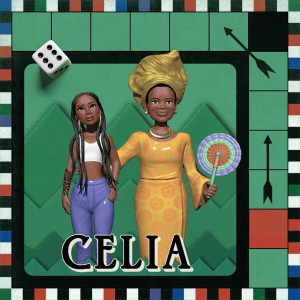

On her third studio album, the Nigerian Superstar deftly infuses R&B/Soul with Afrobeat, rhythmically reflecting on her failed marriage, the rape and assault culture in Nigeria, and what it means to be a strong modern woman.
Tiwa Savage has been called the queen of Afrobeat and her success spans; music, fashion, and television. She is on the vanguard of the hybrid “Afro-Pop” sound and her new album is the peak of her vision so far, a sultry, detailed, and effortless album of feel-good Soul and R&B infused Afrobeat.

Celia is Tiwa’s first album under the international Universal Music Group (UMG) and homage to her mother, Celia. With 13 tracks, Celia can feel heavy under the weight of Tiwa’s personal life compared to her 2015’s exuberant R.E.D and 2013’s Once Upon a Time. But it’s a weight worth carrying. She remains soft and feminine while still giving you the gbas gbos sound.
“Celia is my mum’s name and I wanted to pay homage to her,” Tiwa tells Apple Music. “She embodies everything that this album is. It speaks to a strong, modern African woman. This album is Afrobeats from a very female perspective. It’s an extension of the African woman: she still values her culture and her upbringing, but she’s also well-traveled, so it’s blending those two worlds.”
She hosted me and a few fellow Savage Soldiers to an exclusive virtual streaming party ahead of the release where she introduced Celia – giving us four songs and ‘Save My Life’ stands out for me. A very Afropop song about a girl asking her love interest to take her to the highest levels of euphoria. Literally, “Your love is the only thing that can save my life.” ‘Ole’ ft world boss, Naira Marley, was also one of my standout songs from the listening session with its witty yet bossy lyrics. Other major features include Davido, Steflon Don, and Sam Smith.
Celia comes on the heels of Burna Boy’s Twice as Tall and Fireboy’s Apollo. Where Burna assures himself of his power, self-reflecting and giving a Pan-African crusade while Fireboy sits at the top of popular Nigerian music awash with divergent styles—from more traditional music like highlife to the more modern Afro-fusion, and the mainstream Afrobeats—Tiwa doesn’t box herself into one category; she rests at the intersection of R&B, Soul, Afrobeats, and Pop with a feminine perspective.
I’m so grateful, not just for that record, but what this means for my genre and the movement that we’re pushing. I was having this conversation with my mom the other day, and I said to her, when she moved me to London, I was bullied so much for being African. I used to try and change my accent, and pretend like I wasn’t African. And it wasn’t cool.
“And now being African is one of the coolest things, and afrobeat is the fastest growing genre. And for me, it’s a blessing to live and witness both, to see how it went from not being cool, to being one of the most sought after genres. And not just that, the music is shining a different light on the continent. Africa, we have to rewrite our story.

Leave a Reply